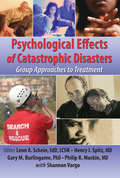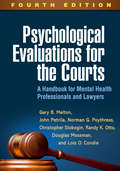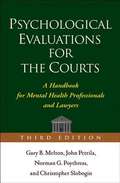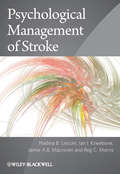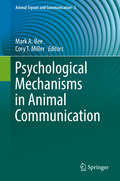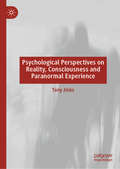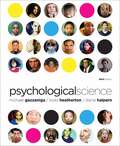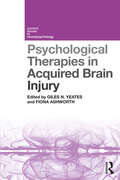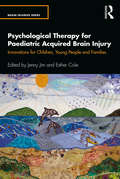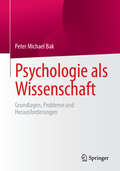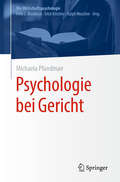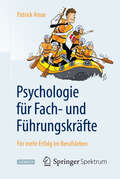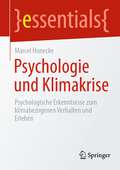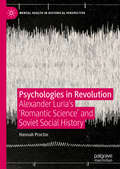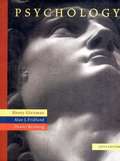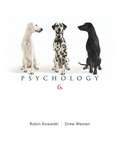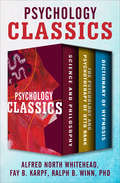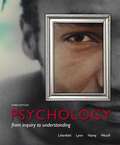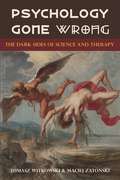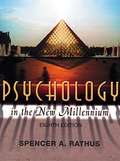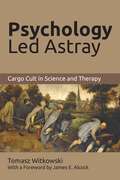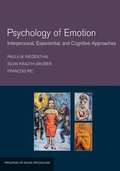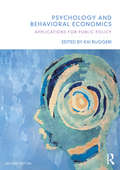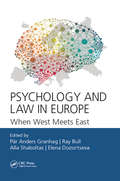- Table View
- List View
Psychological Effects of Catastrophic Disasters: Group Approaches to Treatment
by Philip R. Muskin Joseph Rose Henry I Spitz Leon Schein Gary BurlingameA thorough, user-friendly guide of basic knowledge and group interventions for psychological trauma from terrorist attacks and other catastrophic disastersThere is relatively little literature on the psychological trauma caused by catastrophic disasters, including terrorist attacks and the impending threats of terrorism. Psychological Effects of Catastrophic Disasters: Group Approaches to Treatment fills that gap by comprehensively discussing ways to minimize the psychological damage resulting from catastrophic disasters as well as the trauma developed from the threat of future terrorist attacks. The book provides thorough presentations of almost manualized group methods for the prevention and treatment of the acute and longer-term psychological effects for children, adolescents, and adults.Appropriate treatment immediately after a catastrophe can diminish harmful psychological effects, enhance an individual&’s quality of life, decrease psychosomatic illnesses and the exacerbation of chronic medical conditions, increase the effective utilization of medical facilities, and decrease medical expenses. In this book, internationally renowned authorities provide practical expert suggestions and helpful examples to illustrate the interventions and provide a quick reference for professionals facing the aftermath of prospective terrorist disasters and other catastrophic events. Psychological Effects of Catastrophic Disasters: Group Approaches to Treatment is divided into four sections. The first section provides an overview of the book; the second discusses the foundations and broad issues which potentially affect the outcome of group treatment; the third section presents group models which address the particular needs of children, adolescents, parents, emergency service personnel, and mental health practitioners; and the fourth part considers future directions of treatment. Designed to be used as a comprehensive single source for professionals working with victims of trauma caused by terrorism or catastrophic disaster, this book can be read and used in its entirety, or specific chapters detailing treatments can be chosen and used independently as needed. Extensive references allow opportunities for further research.Psychological Effects of Catastrophic Disasters: Group Approaches to Treatment presents unique first-person accounts of September 11th and examines: the neurobiological effects of a traumatic disaster the effective use of psychotropic medication the implications of living with ongoing terrorist threats a new framework for preparedness and response to disasters and trauma for children and families cultural, religious, and ethnic differences related to the prevention and treatment of psychological sequelae the diagnosis and treatment of traumatic grief retraumatization, distressing reminders, and their effects on post-traumatic adjustment the knowledge trauma therapists need to integrate small group principles the diagnosis and group treatment of acute and long-term effects with adults and children the use of spiritual principles after a terrorist disaster or catastrophic event nine types of groups appropriate for specific populationsPsychological Effects of Catastrophic Disasters: Group Approaches to Treatment is a timely, comprehensive reference for social workers, psychologists, psychiatrists, health professionals, mental health professionals, educators, and students.The royalties from this book shall be donated to organizations which provide direct services to those who continue to be affected by the events of September 11th, 2001 and Hurricane Katrina (August 29th, 2005).
Psychological Evaluations for the Courts, Fourth Edition: A Handbook for Mental Health Professionals and Lawyers
by John Petrila Randy K. Otto Gary B. Melton Norman G. Poythress Christopher Slobogin Douglas Mossman Lois O. CondieTens of thousands of readers have relied on this leading text and practitioner reference--now revised and updated--to understand the issues the legal system most commonly asks mental health professionals to address. Highly readable, the volume demystifies the forensic psychological assessment process and provides guidelines for participating effectively and ethically in legal proceedings. Presented are clinical and legal concepts and evidence-based assessment procedures pertaining to criminal and civil competencies, the insanity defense and related doctrines, sentencing, civil commitment, personal injury claims, antidiscrimination laws, child custody, juvenile justice, and other justice-related areas. Case examples, exercises, and a glossary facilitate learning; 19 sample reports illustrate how to conduct and write up thorough, legally admissible evaluations. New to This Edition *Extensively revised to reflect important legal, empirical, and clinical developments. *Increased attention to medical and neuroscientific research. *New protocols relevant to competence, risk assessment, child custody, and mental injury evaluations. *Updates on insanity, sentencing, civil commitment, the Americans with Disabilities Act, Social Security, juvenile and family law, and the admissibility of expert testimony. *Material on immigration law (including a sample report) and international law. *New and revised sample reports.
Psychological Evaluations for the Courts, Third Edition
by Gary Melton John PetrilaThis is the definitive reference and text for both mental health and legal professionals. The authors offer a uniquely comprehensive discussion of the legal and clinical contexts of forensic assessment, along with best-practice guidelines for participating effectively and ethically in a wide range of criminal and civil proceedings. Presented are findings, instruments, and procedures related to criminal and civil competencies, civil commitment, sentencing, personal injury claims, antidiscrimination laws, child custody, juvenile justice, and more.
Psychological Management of Stroke
by Ian I. Kneebone Jamie A. Macniven Nadina B. Lincoln Reg C. MorrisPsychological Management of Stroke presents a review and synthesis of the current theory and data relating to the assessment, treatment, and psychological aspects of stroke.Provides comprehensive reviews of evidence based practice relating to strokeWritten by clinical psychologists working in stroke servicesCovers a broad range of psychological aspects, including fitness to drive, decision making, prevention of stroke, and involvement of carers and familiesReviews and synthesizes new data across a wide range of areas relevant to stroke and the assessment, treatment, and care of stroke survivors and their familiesRepresents a novel approach to the application of psychological theory and principles in the stroke field
Psychological Mechanisms in Animal Communication
by Mark A. Bee Cory T. MillerThis book analyzes the psychological mechanisms critical to animal communication. The topics covered range from signal neurons to broad-scale phylogenetic patterns, shedding new light on the sensory, perceptual, and cognitive processes that underlie the communicative behaviors of signalers and receivers alike. In so doing, the contributing authors collectively integrate research questions and methods from behavioral ecology, cognitive ethology, comparative psychology, evolutionary biology, sensory ecology, and neuroscience. No less broad is the volume's taxonomic coverage, which spans bees to blackbirds to baboons. The ultimate goal of the book is to stimulate additional research into the diversity and evolution of the psychological mechanisms that make animal communication possible.
Psychological Perspectives on Reality, Consciousness and Paranormal Experience
by Tony JinksThis book explores various explanatory frameworks for paranormal encounters. It opens with the story of an inexplicable human figure seen crossing a secluded hotel corridor, interpreted as a ghost by the sole witness. The subsequent chapters explore the three most important historical perspectives accounting for this and other types of paranormal experience. Each perspective is examined from first principles, with specific reference to what happened in the corridor, how it happened, why it happened, and who might be responsible. The first perspective considers the experience to be legitimate – to be something real – and various possibilities are presented that are grounded in the paranormal and parapsychological literature, among which a “ghost” is one putative explanation. In turn, the second perspective treats the experience as being wholly illegitimate. With reference to psychological theory, the ghost sighting is a product of erroneous consciousness. The third perspective is different yet again, and considers the sighting to be authentic, but argues that explaining the ghost requires a radical departure from conventional models of reality and consciousness. By contrasting these three paths, the book provides a valuable resource for readers interested in the philosophical and psychological origins of explanations for paranormal experiences, from the 19th century to the present. It will appeal to general readers in addition to students and scholars of parapsychology, anomalistic psychology, and consciousness studies.
Psychological Science (3rd Edition)
by Michael S. Gazzaniga Diane F. Halpern Todd F. HeathertonThis edition presents the latest developments in psychology in an engaging, visually stimulating format. The text enhances student understanding and stimulates active learning with Halpern's unique science-of-learning pedagogical system; relevant, real world examples; and an art program tailored especially for visual learners. Instructors and students will benefit from the most integrated media package available for an introductory course.
Psychological Therapies in Acquired Brain Injury (Current Issues in Neuropsychology)
by Fiona Ashworth Giles N. YeatesThe psychological impact of an acquired brain injury (ABI) can be devastating for both the person involved and their family. This book describes the different types of psychological therapies used to ameliorate psychological distress following ABI. Each chapter presents a new therapeutic approach by experts in the area. Readers will learn about the key principles and techniques of the therapy alongside its application to a specific case following ABI. In addition, readers will gain insight into which approach may be most beneficial to whom as well as those where there may be additional challenges. Covering a wide array of psychological therapies, samples range from more historically traditional approaches to those more recently developed. Psychological Therapies in Acquired Brain Injury will be of great interest to clinicians and researchers working in brain injury rehabilitation, as well as practitioners, researchers and students of psychology, neuropsychology and rehabilitation.
Psychological Therapy for Paediatric Acquired Brain Injury: Innovations for Children, Young People and Families (The Brain Injuries Series)
by Jenny Jim Esther ColeChildren, young people and families living with an acquired brain injury (ABI), whether through accident, illness, injury or abuse, are rarely offered psychological therapy, and yet the benefits of such interventions can be profound. This important new book, providing a selection of practice examples and insights from frontline practitioners, will be essential reading for any paediatric therapist or clinician. Beginning with a "life story" of the brain where emphasis is placed on how brain development is fundamentally related to its environment, the book offers key background knowledge before showcasing the core topics of assessment, psychological formulation and intervention. It features a range of therapeutic models, includes direct and indirect work, group work and family therapy, with settings varying from inpatient neurorehabilitation to community work and the transition to education. The long-term needs of those in the criminal justice system are also addressed. The closing chapters focus on the debate around effective outcome measurement and outline a vision for better services. Elevating the voices of our children, young people and families living with ABI, this pioneering book will provide practitioners with the confidence to work collaboratively across a range of children and young people with disorders of consciousness or communication to those with behaviour that challenges others to manage. It offers new ways to understand both children’s pasts and their futures, and will be essential reading for anyone in the field.
Psychologie als Wissenschaft: Grundlagen, Probleme und Herausforderungen
by Peter Michael BakDieses Buch widmet sich der Psychologie als Wissenschaft. Die Psychologie hat sich zwar längst als Wissenschaft etabliert, dennoch sind noch viele grundlegende Fragen in Bezug auf den Untersuchungsgegenstand und die wissenschaftliche Herangehensweise offen. Es geht um Fragen wie: Kann man die Psychologie wie eine Naturwissenschaft betreiben oder entzieht sich menschliches Verhalten und Erleben einer solchen Herangehensweise? Wie versucht die Psychologie ihre wissenschaftlichen Ziele zu erreichen? Was verstehen wir eigentlich unter Beschreiben, Erklären oder Vorhersagen in der Psychologie? Und was können wir unter psychologischen Theorien, Hypothesen und Prüfungen genau verstehen? Welche aktuellen Probleme behindern den wissenschaftlichen Fortschritt und was kann man dagegen unternehmen? Ohne auf solche Fragen eine Antwort geben zu können, kann man Psychologie als Wissenschaft nicht wirklich betreiben. Aber auch die psychologische Anwendungspraxis muss darauf Antworten finden, wenn es beispielsweise darum geht, Interventionen zu rechtfertigen und zu begründen. Das Buch gibt zu diesen Fragen einen Überblick, benennt Probleme und Schwierigkeiten der Wissenschaft Psychologie und gibt Anregungen, wie man die Psychologie wissenschaftlich weiterentwickeln kann.
Psychologie bei Gericht (Die Wirtschaftspsychologie)
by Michaela PfundmairDieses Buch bietet einen Überblick über die wichtigsten Fragestellungen der Rechtspsychologie, die sich im Rahmen von Gerichtsverhandlungen ergeben. Sie erfahren, wie forensisch-psychologische Gutachter ihre Bewertungen im Einzelfall vornehmen. Im Zentrum stehen Themen wie die Aussagepsychologie und die Familienrechtspsychologie. Wissenschaftliche Grundlagen werden mit zahlreichen Fallbeispielen und Bezügen zur Praxis verbunden. So ist das Buch auch für Leser ohne Fachkenntnisse leicht lesbar. Im Buch erfahren Sie… wie überprüft werden kann, ob eine Schilderung auf wahrem Erleben basiert.wie bewertet werden kann, wer Sorgerecht und Umgang bei einem Kind erhält und was bei Kindeswohlgefährdung passiert.wie abgeschätzt werden kann, ob ein Rechtsbrecher rückfällig wird.wie geprüft werden kann, ob ein Rechtsbrecher schuldfähig oder strafmündig ist.wie die Zuverlässigkeit einer Personenbeschreibung oder -identifizierung bewertet und wie sie verbessert werden kann.welchen psychologischen Effekten Richter und andere urteilende Verfahrensbeteiligte unterliegen. Zielgruppen: "Psychologie bei Gericht“ ist für alle lesenswert, die im weitesten Sinne mit Gerichten arbeiten – von psychologischen Gutachtern über Staatsanwälte bis hin zu Sozialarbeitern, aber auch Studierende und interessierte Laien, die mehr über die Themen und Tätigkeitsfelder der Forensischen Psychologie erfahren wollen. Die Autorin Michaela Pfundmair, Prof. Dr. phil. habil., Psychologin, ist Professorin an der Hochschule des Bundes in Berlin, wo sie zu sozial- und rechtspsychologischen Themen forscht und lehrt. Zu diesen Themenkomplexen publizierte sie international zahlreiche wissenschaftliche Artikel. Zudem arbeitet sie als aussagepsychologische Sachverständige, prüft und supervidiert Personen in der Weiterbildung für Rechtspsychologie BDP/DGPs und ist Vorsitzende der Sektion Rechtspsychologie im BDP.
Psychologie für Fach- und Führungskräfte: Für mehr Erfolg im Berufsleben
by Jutta Bretthauer Patrick AmarKonzepte und Themen wie positives Denken, Abwehrmechanismen, emotionelle Intelligenz, Überzeugungskommunikation, kognitive Dissonanz, Commitment-, Motivations- und Leadershiptheorien, interkulturelle Unterschiede, Stress und Work-Life-Balance beruhen alle auf zentralen psychologischen Theorien. Psychologie und Management sind eng miteinander verflochten. Die Psychologie stellt Unternehmen einen reichhaltigen Schatz an empirischen Erkenntnissen zur Verfügung, die die Managementtheorien gut ergänzen. Ausgehend von grundlegenden Experimenten aus den Gebieten der klinischen Psychologie, sowie der Sozial- und Organisationspsychologie zeigt Patrick Amar in diesem Werk Konzepte und Tools auf, die die Managementpraxis erklären, ergänzen und erweitern. Darüber hinaus gibt dieses Werk derzeitigen und zukünftigen Führungskräften wertvolle Impulse zur persönlichen und professionellen Weiterentwicklung und ist somit eine Pflichtlektüre für alle, die ihre ganz persönliche Work-Life Balance anstreben.
Psychologie und Klimakrise: Psychologische Erkenntnisse zum klimabezogenen Verhalten und Erleben (essentials)
by Marcel HuneckeAuf der Grundlage umweltpsychologischer Erkenntnisse werden Ansatzpunkte und Strategien zur Förderung nachhaltigen Verhaltens benannt. Eine sozial-ökologischen Transformation erfordert jedoch nicht nur die Veränderung von spezifischen Verhaltensweisen, sondern umfassende Veränderungen in den bestehenden Lebensstilen. Der Ansatz der psychischen Ressourcen verfolgt dieses Ziel durch die Berücksichtigung des subjektiven Wohlbefindens als zentrale Motivationsquelle für nachhaltiges Verhalten. Hierbei gilt es auch die durch die Klimakrise verursachten Gefühle der Macht- und Hilflosigkeit zu überwinden, um das individuelle und kollektive Engagement für den Klimaschutz zu stärken.
Psychologies in Revolution: Alexander Luria’s 'Romantic Science' and Soviet Social History (Mental Health in Historical Perspective)
by Hannah ProctorThis book situates the work of the Soviet psychologist and neurologist Alexander Luria (1902-1977) in its historical context and explores the 'romantic' approach to scientific writing developed in his case histories. Luria consistently asserted that human consciousness was formed by cultural and historical experience. He described psychology as the ‘science of social history’ and his ideas about subjectivity, cognition and mental health have a history of their own. Lines of mutual influence existed between Luria and his colleagues on the other side of the iron curtain, but Psychologies in Revolution also discusses Luria’s research in relation to Soviet history – from the October Revolution of 1917 through the collectivisation of agriculture and Stalinist purges of the 1930s to the Second World War and, finally, the relative stability of the Brezhnev era – foregrounding the often marginalised people with whom Luria’s clinical work brought him into contact. By historicising science and by focusing on a theoretical approach which itself emphasised the centrality of social and political factors for understanding human subjectivity, the book also seeks to contribute to current debates in the medical humanities.
Psychology (6th Edition)
by Drew Westen Robin M. KowalskiPsychologists will discover the inherent drama and indispensable human component of psychology science with this updated text. The Research in Depth feature presents classic case studies along with exercises that help reinforce concepts related to research methodology. New Psychology at Work sections offer information specifically related to I/O or human factors as well as describe the role that psychology plays in various applied settings. Profiles in Positive Psychology also gives psychologists a look at the application of psychology to their daily lives, and exposes them to key topics in positive psychology
Psychology (AP Edition)
by Philip G. Zimbardo Robert L. Johnson Ann L. Weber Craig W. GruberPsychology AP* Edition has been specifically designed to prepare you for the AP* Exam,with a close eye on content coverage and accuracy.
Psychology Classics: Science and Philosophy, The Psychology and Psychotherapy of Otto Rank, and Dictionary of Hypnosis
by Alfred North Whitehead Ralph B. Winn Fay B. KarpfThree classic texts in one: essays by Alfred North Whitehead, an authoritative study of Otto Rank, and an essential reference book on hypnosis. In Science and Philosophy, Alfred North Whitehead presents his mature thought on topics ranging from education to science and mathematics; from the theories of John Dewey to Albert Einstein. These collected essays cover his positions in a deep and extraordinarily unified way. Austrian psychologist Otto Rank is one of the most influential figures of modern psychotherapy. A protégé́ of Sigmund Freud, he made significant developments in the fields of analysis, psychotherapy, counseling, education, and social work. In The Psychology and Psychotherapy of Otto Rank, social psychologist Fay B. Karpf—who studied with Rank—presents an authoritative analysis of his pioneering work and legacy.Dictionary of Hypnosis has been an essential text on the subject since its first publication in 1965. Written by psychology professor Dr. Ralph B. Winn, this wide-ranging reference book provides a substantial amount of information on the history of hypnosis and its various uses in contemporary medicine, psychology and other sciences.
Psychology From Inquiry to Understanding, Third Edition
by Scott O. Lilienfeld Nancy J. Woolf Laura L. Namy Steven Jay LynnProvides students with the tools they need to go from inquiry to understanding.<P> Psychology: From Inquiry to Understanding, 3/e provides the framework students need to go from inquiry to understanding by continuously modeling the application of the six key principles of scientific thinking. The text teaches students how to test their assumptions, and motivates them to use scientific thinking skills to better understand the field of psychology and the world around them.<P> MyPsychLab is an integral part of the Lilienfeld / Lynn / Namy / Woolf program. Key learning applications include writing assessment, MyPsychLab video series, and simulations.<P> This text is available in a variety of formats – digital and print. Pearson offers its titles on the devices students love through Pearson’s MyLab products, CourseSmart, Amazon, and more.<P> Teaching & Learning Experience<P> This program will provide a better teaching and learning experience -- for you and your students. Here's how:<P> * Personalize Learning – MyPsychLab is an online homework, tutorial, and assessment program. It helps students prepare for class and instructor gauge individual and class performance.<P> * Improve Critical Thinking – Numbered learning objectives and section summaries help readers build critical thinking and study skills.<P> * Engage Students – Visual activities, such as labeling of figures and completion of summary tables, help students review key concepts.<P> * Explore Research – “Apply Your Scientific Thinking Skills” questions are tied to outside research assignments.<P> * Support Instructors – Support Instructors—A full set of supplements, including MyPsychLab, provides instructors with all the resources and support they need.<P>
Psychology Gone Wrong: The Dark Sides of Science and Therapy
by Tomasz WitkowskiPsychology Gone Wrong: The Dark Sides of Science and Therapy explores the dark sides of psychology, the science that penetrates almost every area of our lives. It must be read by everyone who has an interest in psychology, by all those who are studying or intend to study psychology, and by present and potential clients of psychotherapists. This book will tell you which parts of psychology are supported by scientific evidence, and which parts are simply castles built on sand. This is the first book which comprehensively covers all mistakes, frauds and abuses of academic psychology, psychotherapy, and psycho-business.
Psychology In The New Millennium, 8e
by Spencer A. RathusThis best-selling text not only explores psychological theory and research, but also emphasizes their application to the lives of students. Spencer Rathus is a talented author with a widely celebrated writing style that makes psychology interesting, appealing, and relevant for students. A great amount of detail has gone into updating this text, including: the additions of a new chapter, "Adolescent and Adult Development;" a new feature, "Controversy in Psychology," which embraces controversies in psychology as vehicles for enhancing knowledge and stimulating critical thinking; and a new pedagogical approach, PQ4R (outlined below). This new edition also features greater emphasis on the evolutionary perspective, as well as a new connection to the Web and the text's CD-ROM using the author's trademarked method.
Psychology Led Astray: Cargo Cult in Science and Therapy
by Tomasz WitkowskiThis book shows how scientific and psychotherapeutic practices change into worthless rituals called by the famous physicist, Richard Feynman, "cargo cult." It is a must-read for everybody who is interested in psychology, who is studying or intends to study it, but also for present and potential clients of psychotherapists and parents of mentally-disabled children. Readers will learn which parts of psychology and therapy are cargo-cult-like and which are reliable. This book is the second part of trilogy devoted to the dark side of psychology.
Psychology Of Emotion: Interpersonal, Experiential, And Cognitive Approaches
by Paula M. Niedenthal Silvia Krauth-Gruber François RicThis textbook discusses fundamental issues in the definition and measurement of emotion, including: conscious and unconscious processes; the ways in which emotions arise in, and are constrained by, social situations and social processes; the regulation and sharing of emotion and their effects of mental health; and the manner in which culture (including subculture) shapes or moderates some of these processes. The book also focuses on the component processes of emotion, their functions, and the ways in which these interact with the social environment. Rather than deny either that emotions are biologically determined or that they are culturally created or shaped, both biology and social situation are treated as important forces in the elicitation and the experience of emotion. Each section of the book is structured around specific approaches or models, and the precise questions that they were constructed to address. The theories and models are also placed in their in historical context. Discussion of the different approaches is elaborated by summaries of the extant scientific evidence, as well as examples of specific experiments or studies that were designed to evaluate the question. Timely, engaging real-world examples are used from a variety of international contexts. The pedagogic features, including concise introductions and summaries, discussion questions, and suggested readings, have been incorporated into the volume, making this an ideal text for a course of Emotion, which can be found as an option within many social psychology and cognitive psychology courses.
Psychology and Behavioral Economics: Applications for Public Policy
by Kai RuggeriPsychology and Behavioral Economics offers an expert introduction to how psychology can be applied to a range of public policy areas. It examines the impact of psychological research for public policymaking in economic, financial, and consumer sectors; in education, healthcare, and the workplace; for energy and the environment; and in communications. Your energy bills show you how much you use compared to the average household in your area. Your doctor sends you a text message reminder when your appointment is coming up. Your bank gives you three choices for how much to pay off on your credit card each month. Wherever you look, there has been a rapid increase in the importance we place on understanding real human behaviors in everyday decisions, and these behavioral insights are now regularly used to influence everything from how companies recruit employees through to large-scale public policy and government regulation. But what is the actual evidence behind these tactics, and how did psychology become such a major player in economics? Answering these questions and more, this team of authors, working across both academia and government, present this fully revised and updated reworking of Behavioral Insights for Public Policy. This update covers everything from how policy was historically developed, to major research in human behavior and social psychology, to key moments that brought behavioral sciences to the forefront of public policy. Featuring over 100 empirical examples of how behavioral insights are being used to address some of the most critical challenges faced globally, the book covers key topics such as evidence-based policy, a brief history of behavioral and decision sciences, behavioral economics, and policy evaluation, all illustrated throughout with lively case studies. Including end-of-chapter questions, a glossary, and key concept boxes to aid retention, as well as a new chapter revealing the work of the Canadian government’s behavioral insights unit, this is the perfect textbook for students of psychology, economics, public health, education, and organizational sciences, as well as public policy professionals looking for fresh insight into the underlying theory and practical applications in a range of public policy areas.
Psychology and Law in Europe: When West Meets East
by Pär Anders Granhag, Ray Bull, Alla Shaboltas and Elena DozortsevaOffering carefully curated articles from the European Association of Psychology and Law (EAPL), this book features chapters from a truly international group of scholars. This text is the first of its kind to offer insights into current developments in psychology and law in Russia. The field of psychology and law has a very long and strong tradition in Russia, but very little is known, as Russian scholars rarely publish their works in English. The volume also contains state-of-the-art chapters on topics at the very core of psychology and law, including offender profiling, lie detection, crime linking, false memories, and witness interviewing. Features Provides rare insight into Russian history of forensic and criminal psychology Covers core topics in the discipline Offers international scope from a diverse array of contributors Psychology and Law in Europe: When West Meets East is a text of interest for students of psychology, law, or criminal justice, as well as scholars and practitioners in the field. This text offers a window into global advances in psychology and law.
